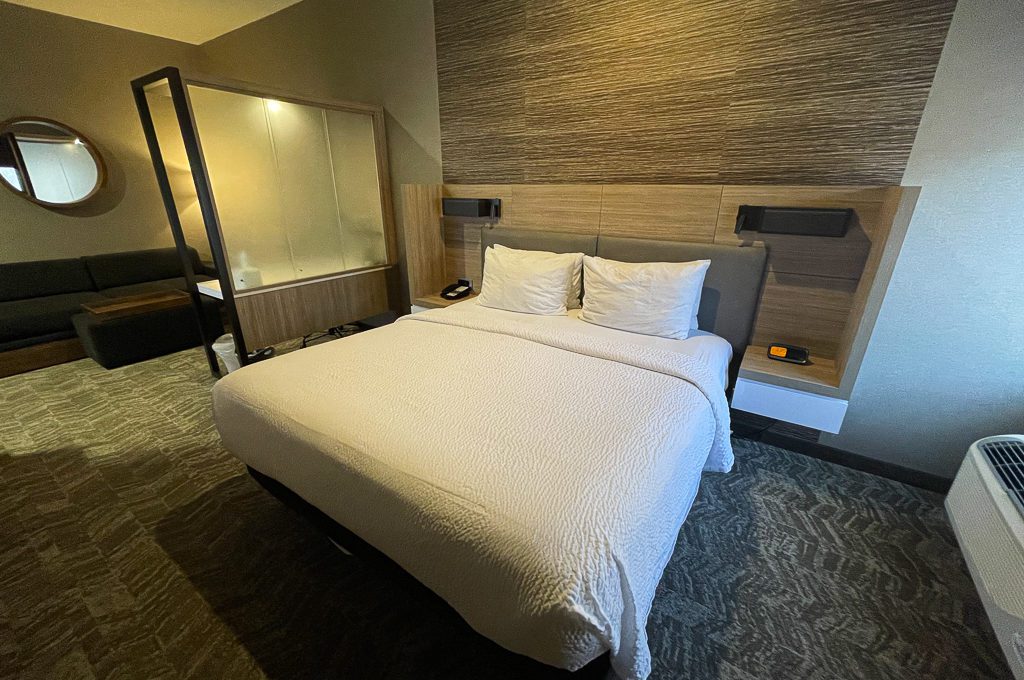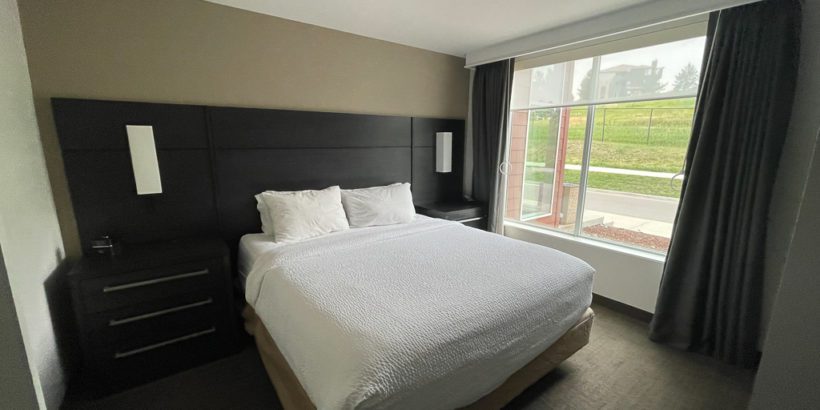Some businesses require or ask employees to share hotel rooms when on business travel. As a frequent traveler and business owner who values high-performing employees, I am here to tell you why this is a bad idea.
First, we’re going to talk about sharing rooms solely for business travel. I’ll break down some of the concerns that a lot of people may not think about or even want to talk about. By the end of it, hopefully, you’ll see the light and realize that shared hotel rooms is not the way to go in most cases.
Then I will talk about a different predicament that occurs when sharing hotel rooms which is sharing rooms as unmarried spouses or same-sex spouses in destinations that are not so welcoming to “non-traditional” couples.
Tip: Use the free app WalletFlo to help you travel the world for free by finding the best travel credit cards and promotions!
Table of Contents
Sharing hotel rooms for business travel
As an experienced traveler and business owner, I feel pretty strongly that asking employees to share hotel rooms is a very bad decision.
There are two exceptions to my position, though.
If your company culture is designed in such a way that sharing rooms is not a big deal then obviously it won’t be a problem. This might be the case in a small start up full of close-knit relationships or certain industries where there is less privacy involved on a regular basis.
Also, on something like an informal company retreat, things might be a little bit different since the focus of the trip is on relaxation and perhaps relationship building.
But when the primary purpose of the travel is to conduct business, I don’t think sharing rooms is a wise choice.
Let’s go through the top reasons why it is such a horrible idea.
You want well-rested employees
The biggest reason why you don’t want your employees sharing a hotel room this because you want them to be performing at an optimal level when out on business travel.
Consider that reducing sleep by only 1.5 hours for just one night could result in a reduction of daytime alertness by as much as 32 percent.
Whether it is participating in discussions in a meeting, presenting in court, speaking at a major convention, touring a facility, you don’t want your employees to be more hampered than they already will be just from traveling.
Here are some reasons why your employees may not get good rest when sharing a room.
By forcing workers to share a hotel room with another employee, you are essentially forcing your employee to remain “on” at all times.
This is even more so the case if you are pairing an executive or manager with a subordinate.
Unless the employee sharing the room already has a very intimate relationship with the other person, that employee is most likely going to feel pressure to keep their “work face” on for 24 hours.
That can be extremely taxing for some people and could definitely impact their sleep and thus work performance in a major way.
This is especially true if you are dealing with an introverted employee.
The worst case would probably be pairing an extrovert with an introvert. This is because the extrovert would happily discuss work or just life happenings throughout the evening while the introvert is desperately attempting to recharge for the next day.
Another problem is that employees could have vastly different and incompatible sleeping preferences.
Let’s say that one employee has to sleep with the TV on or with a white noise machine but the other one demands complete silence. That’s going to be a major problem.
Temperature is another major consideration. If two people have vastly different preferences for nighttime temperatures that could cause one of them to miss out on a good night of sleep.
And what about if one employee normally sleeps in the nude (like 17% of the population)?
They may struggle to get comfortable all night by not removing their clothes and if they do strip down, you might be introducing grounds for some sort of sexual harassment/legal liability or personell rift within your company.
Then there is the possibility that one employee does not keep up with their hygiene.
Are you really going to force another employee to bunk with them and then endure odors and a space cluttered with dirty clothes and room service remnants?
Bear in mind, so far we are only talking about two people sharing a room. These issues get multiplied as you start to approach the limit of guests for a hotel room.
Overall, taking away these type of comforts from your employees might seem very small but they all add up and can make your employees uncomfortable, unmotivated, and unhappy.
Employees may not always voice their concerns about these but you can virtually count on them quietly contemplating them as they take toll after toll on their productivity and morale.
Bottom line: If you want your team to perform at an optimal level, prioritize good sleep for them on business travel.
Privacy
Irrespective of introvert or extrovert status, a lot of people just want privacy.
Consider that seven percent of the population (21 million Americans) suffer from paruresis, which is also known as “shy bladder syndrome.” The idea of going to the bathroom in quiet, close-quarters while a coworker or boss sits back only a feet away from their bathroom door is enough to set off cascades of anxiety.
Or perhaps an employee has a really bad snoring habit (like a quarter of the population) and they will find it really embarrassing to share a sleeping space with another employee who certainly will not appreciate the snoring.
A lot of people like to meditate or do yoga these days and can find it difficult or impossible to have a good session with a stranger sitting up in a bed three feet away watching Sports Center.
And maybe your employee has a presentation to give the next day? Are they going to be able to practice and rehearse the presentation if they can’t get alone time in their room?
There is also the whole showering and changing aspect of things. Not everyone is comfortable getting dressed in front of coworkers or acquaintances and having to go in and out of the bathroom to get dressed is just annoying.
Under no circumstances would I ever ask employees to share a bed either. I don’t care if it is a California king bed, requiring or even asking employees to share a bed is just opening up a whole new legal can of worms and is low-key disrespectful.
And yes, they could request a rollaway bed but that brings us to the main point of this article regarding sharing a room.
Medical reasons
Related to general privacy is medical privacy.
A lot of people have medical issues that they are mostly able to conceal while working a typical day job at the office. In fact, only 39% of employees with disabilities have disclosed them to their manager.
Perhaps they have established procedures for dealing with bathroom issues or taking certain types of medications.
But if they were required to share a hotel room — especially for something like an extended stay — they may have to reveal pretty sensitive things about them.
The last thing you want is an employee stressing out every night about “coming out” with a major medical issue when you are trying to conduct business at a high-level.
Co-worker hostility
If you are forcing your employees to endure the discomforts above there’s a good chance they might blame you or the company.
But there is also a high chance they will blame the person (co-worker) causing the annoyances. This could cause rifts within your team and could cancel out any of the “team building” you were hoping would happen by sharing rooms.
It sends the wrong message
By forcing employees to share a hotel room you also are sending the wrong message as a business owner. You are essentially telling them that their comfort and privacy needs are not important enough for you to accommodate them.
It also may raise questions about how well resourced you are as a business if you can’t afford to offer individual hotel rooms to your employees. I mean, can you really afford to send your employees out on business travel if you can’t afford to offer them individual rooms?
If you have to make them share a room
If you are going to require your employees to share a hotel room at least be considerate enough to try to book a hotel suite with multiple bedrooms (not just something like a junior suite).
If each employee has their own bedroom and ideally bathroom that really should not be a problem because they should be able to retain a high level of privacy that would alleviate most of the issues above.

Sharing a room as an unmarried couple or same-sex couple
Sharing a hotel room as an unmarried couple or same-sex couple is a completely different matter.
In this situation, the hotel guests want to share a room and/or share a bed but there may be a worry about some sort of taboo custom or even violation of the law in a country.
For example, several countries still do not permit same sex couples to get married and have even criminalized homosexual activity.
If we are talking about a city like Dubai, the rule of thumb is to just keep things private.
Let’s say that you are a gay couple — two males or two females.
It’s very possible that you could book a single room for the two of you to share — even one with just one king bed — and not encounter any issues. In fact, you might find the hotel staff to be extremely welcoming and warm to you even if they can probably infer you are traveling as a same-sex couple.
This is true even when visiting destinations like the Maldives where it is obvious you are visiting for some sort of romantic getaway.
How do I know this?
I’ve traveled with Brad as a gay married couple over the past seven years to several countries that on the books are extremely anti-gay. In every circumstance we’ve booked a single room with a single king bed and have not encountered any issues.
There have been those slightly awkward moments where they ask if we want two separate beds but once we clarify we want a single bed there has never been an outward negative response.
Where things get questionable is when you are dealing with public displays of affection.
For example, if you are a gay couple at a hotel in the Middle East making out in the hotel lobby and then you head to your shared hotel room, you may have attracted attention to yourself and could end up in a pretty bad situation.
So when sharing a hotel room in a place that is not welcoming to your type of relationship it basically comes down to using common sense and erring on the side of being discreet.
Of course, you should also always be prepared for the unexpected. While Brad and I have never had issues with sharing rooms/beds in suspect countries, it’s always possible something could come up on your stay.

Final word
Sharing a hotel room for business travel is something I would always recommend against unless it just absolutely cannot be avoided or you have a business culture where it is not a problem. But for most standard companies, it sends the wrong message to your employees and may cause them to underperform just so you can save a few bucks.
When it comes to sharing a hotel room for non-traditional couples in certain countries it is often not a problem but you still need to be aware of drawing attention to yourself and be prepared for a potential situation.
Daniel Gillaspia is the Founder of UponArriving.com and the credit card app, WalletFlo. He is a former attorney turned travel expert covering destinations along with TSA, airline, and hotel policies. Since 2014, his content has been featured in publications such as National Geographic, Smithsonian Magazine, and CNBC. Read my bio.

